|
|
|
Sort Order |
|
|
|
Items / Page
|
|
|
|
|
|
|
| Srl | Item |
| 1 |
ID:
160633
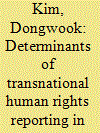

|
|
|
|
|
| Summary/Abstract |
Why do some national governments in East and Southeast Asia receive more transnational scrutiny and pressure on their domestic human rights practices than others? This article argues that transnational human rights reporting is more likely to target states where domestic activists and victims are densely connected with human rights international nongovernmental organizations (INGOs) through a local membership base. Human rights INGOs increase social demands and opportunities for transnational human rights reporting by strengthening local actors’ capabilities to leverage human rights and international solidarity as an advocacy strategy, and by mobilizing them for monitoring and information collection on the ground. Event count analyses of 25 Asian states from 1977 to 2008 find robust support for the theory, using new data on Amnesty International's human rights reporting and human rights INGOs’ local membership base, and controlling for government respect for human rights, regime type, military power, and other factors.
|
|
|
|
|
|
|
|
|
|
|
|
|
|
|
|
| 2 |
ID:
160630
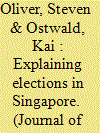

|
|
|
|
|
| Summary/Abstract |
The People's Action Party (PAP) of Singapore is one of the world's longest ruling dominant parties, having won every general election since the country's independence in 1965. Why do Singaporeans consistently vote for the PAP, contrary to the expectations of democratization theories? We argue that valence considerations—specifically, perceptions of party credibility—are the main factor in the voting behavior of Singapore's electorate, and are critical to explaining the PAP's resilience. Furthermore, we argue that the primacy of valence politics arose in part by design, as the PAP has used its control of Singapore's high-capacity state to reshape society and thereby reshape voter preferences towards its comparative advantages. We use a multi-methods approach to substantiate this argument, including a comprehensive quantitative analysis of recent elections. Ultimately, our findings suggest that a focus on valence politics can increase the resilience of dominant parties, but that such a strategy also faces natural limits.
|
|
|
|
|
|
|
|
|
|
|
|
|
|
|
|
| 3 |
ID:
160635


|
|
|
|
|
| Summary/Abstract |
Over the past 30 years, Southeast Asia has experienced rapid growth in intra-regional economic activity, but despite the remarkable diminution in the frequency and intensity of military conflict and crises, it has not been free of interstate disputes, such as maritime disputes. However, the struggle against maritime crime activities such as maritime piracy is a priority for all countries of the region, as well as one of the unavoidable prerequisites for the achievement of the regional economic security. This research note focuses on the impact of maritime piracy on the Southeast Asian countries’ trade. Bilateral trade flows among the Southeast Asian countries over the 1994 to 2013 period are used to estimate an augmented gravity model that includes various measures of maritime crime activities. The purpose is to find the evidence to indicate how maritime piracy has affected the volume of intra-regional trade.
|
|
|
|
|
|
|
|
|
|
|
|
|
|
|
|
| 4 |
ID:
160632
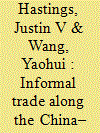

|
|
|
|
|
| Summary/Abstract |
Why do Chinese traders along the China–North Korea border turn to informal trade, and what does it provide for them? Using a unique set of interviews with Chinese formal and informal traders operating in North Korea, we argue that the strategies of informal trade are a calculated response to certain types of risk. In doing so, we introduce a typology of risks and the mechanisms by which informal trade allows traders to mitigate those risks. Because informal traders bypass trade regulations and border checkpoints, they are able to mitigate risk more cheaply than formal traders in some cases and can overcome barriers that can cause failure in formal trade. Informal traders can thus maintain trade in many circumstances, including across North Korean personnel instability and policy reversals, Chinese sanctions enforcement, and delays and smuggling crackdowns on both sides of the border.
|
|
|
|
|
|
|
|
|
|
|
|
|
|
|
|
| 5 |
ID:
160634
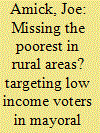

|
|
|
|
|
| Summary/Abstract |
This article utilizes an original household survey of two regency-level elections in Indonesia to explore campaign targeting. It uses a list experiment to show that direct survey questions about accepting transfers from campaigns elicit honest responses from respondents in Indonesia. Although the relationship between income and whether a respondent accepted transfers from political campaigns decreases over the entire distribution of income, it increases initially, producing a curvilinear relationship between income and accepting transfers from campaigns. This article argues that the poorest voters face barriers to being targeted by campaigns. However, these barriers recede as they become relatively richer, at which point a negative relationship is found due to diminishing marginal utility of accepting these transfers. Finally, in-kind transfers, as opposed to cash transfers, target low-income voters more effectively.
|
|
|
|
|
|
|
|
|
|
|
|
|
|
|
|
| 6 |
ID:
160631
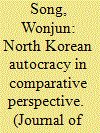

|
|
|
|
|
| Summary/Abstract |
The North Korean regime is unique among dictatorships because it is both long-lasting and highly personalized. We argue that initial factionalization of the regime, coupled with the presence of multiple foreign backers early in the regime, allowed the first leader to personalize the regime by first wresting power from the military and then subsequently curbing the autonomous power of the Korean Worker's Party. Using a measure of personalism constructed from historical data, we trace the consolidation of personal power in the North Korean regime and compare it to other communist regimes in the region to show how the evolution of personalist rule in these cases differed. We then explain this sequence of personalization in North Korea by showing how regime imposition by one foreign power, the Soviet Union, combined with military backing from a second foreign power, China, incentivized Kim Il-sung to consolidate personal control over the military and internal security apparatus by reducing the threat of military backlash.
|
|
|
|
|
|
|
|
|
|
|
|
|
|
|
|
|
|
|
|
|